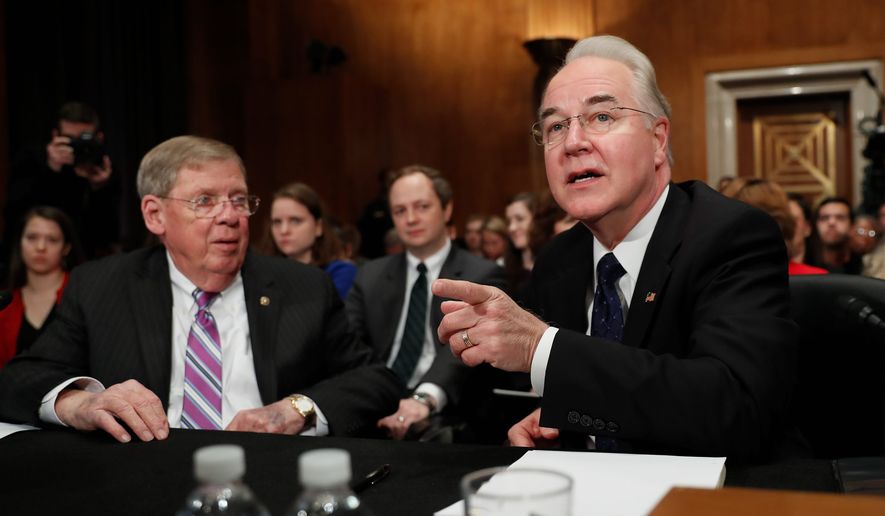The Trump administration will have to make quick decisions about Obamacare’s mandate of cost-free birth control, facing looming legal and political deadlines that will determine just how much flexibility the new president wants to give on the thorny issue.
Within hours of being sworn in, President Trump signed an executive order aimed at lifting regulatory burdens and fines imposed by the Affordable Care Act, signaling he is serious about using his authority to dismantle the law once his health team is in place.
The leader of that team, Rep. Tom Price, will have his Senate confirmation hearing Tuesday, where the contraception issue could play a role.
Pro-life advocates say they’re counting on Mr. Trump and Mr. Price to free religious nonprofits from the mandate requiring them to file a certification if they want to opt out of providing birth control for their employees.
A case over that mandate has raged all the way to the U.S. Supreme Court.
“We are fully confident that Mr. Trump, Mr. Price and the entire new administration will act as swiftly as they can to bring this long saga to a conclusion,” said Father Frank Pavone, director of Priests for Life, a pro-life ministry that opposes emergency contraceptives it equates with abortion.
The contraceptive mandate was part of the Obama administration’s policies in carrying out Obamacare. The Health and Human Services Department said most employers must provide insurance that cover 18 types of FDA-approved contraceptives, including birth control pills or the morning-after pill that some religions object to as sinful.
Houses of worship were exempt from the mandate, but religious-based charities, including some private schools or Catholic hospitals, were not. Instead the government offered an accommodation requiring the nonprofits to opt out of the coverage through a written form, which then would trigger the insurers or the government to step in.
The Little Sisters of the Poor, an order of Catholic nuns dedicated to caring for the elderly, and a number of other charities sued, saying that signing the form made them complicit in providing the contraceptives they object to.
Mr. Trump can probably settle the dispute through rule-making, though that “should take some time,” said Timothy Jost, a law professor at Washington and Lee University in Virginia who closely tracks the health care reform debate.
“The administration could presumably agree to draft a rule providing for a broader religious exception as a way of settling the lawsuits,” Mr. Jost said. “It could perhaps even decide to end the contraception requirement, but it would have to explain why it believed that women no longer need contraception as a preventive service.”
Father Pavone said another option is to simply remove the most objectionable items from the list of contraceptions that must be covered. Many of the lawsuits against Mr. Obama cited the morning-after pills, such as “Plan B” or “ella,” as the problem.
Dismantling Mr. Obama’s birth control rules carries some political risk, however. Hundreds of thousands of protesters took to the streets of the District of Columbia and cities around the world as part of a “Women’s March” against Mr. Trump’s previous comments about women and GOP policies, particularly on reproductive health.
“The Trump administration would be out of step with our country if it tried to rescind the contraception requirement — it’s a very popular ACA provision. And the massive women’s marches on Saturday demonstrate that women will hold the Trump administration accountable,” said Brigitte Amiri, a senior staff attorney at the American Civil Liberties Union.
Mr. Price will be at the heart of any decisions about the mandate. In a first hearing last week, he declined to commit to the same level of birth control coverage as the Obama administration demanded.
“What I’ll commit to, and assure, is that women and all Americans need to know that we believe strongly that every single American ought to have access to the kind of coverage and care that they desire and want,” he told Sen. Patty Murray of Washington, ranking Democrat on the Senate Health Committee.
“Birth control is an essential part of women’s health care,” Ms. Murray said, “and if you’re confirmed, I will be holding you accountable for that.”
• Tom Howell Jr. can be reached at thowell@washingtontimes.com.




Please read our comment policy before commenting.